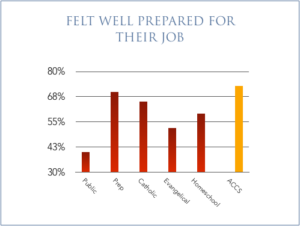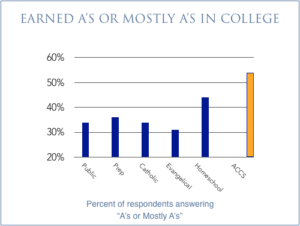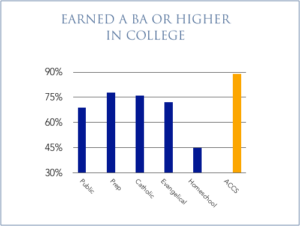April 19, 2021 | Good Soil
Prepared for Life: Good Soil (3)

I always laugh when I see my youngest child try to build something. He has a knack for always picking the biggest and heaviest block to put on top of his usually already very unstable tower. When it begins to topple over, he is always so frustrated and seems so surprised. Of course at eighteen months, he knows little of proper engineering or gravity. Eventually, he will learn that the buildings that last start with a proper foundation. This is also true for education. What a student needs for an optimal experience in college, career, and life beyond starts in those early years and is built year by year on a sturdy framework.
It was not surprising to see the results of the Good Soil Report. ACCS students reported that they felt prepared for college, and many excelled above the average. More than any other category, ACCS students also sought higher degrees and reported feeling well prepared for their jobs. These results are not simply because ACCS students did well on their SATS or made sure to graduate with a high GPA. These students were formed and prepared along the way starting in their very early years at school.
A classical Christian education is thoughtfully structured through the Trivium of Grammar, Logic, and Rhetoric, where each stage focuses on necessary skills and content that leads to the next. There is great integration across the subjects and throughout the grades. Curriculum is not chosen at a teacher’s whim or based on what is culturally popular at that moment. It is cohesive and built upon year after year.
When I look at our high schoolers’ projects, I am always blown away at what they are able to write and accomplish. I am reminded how they got to the place of being able to produce such professional work: introducing cursive in first grade, studying the whole timeline of history from the ancient years to the modern era, drilling sentence grammar, having daily composition practice where students imitate excellent language, and engaging in thought-provoking questions from great books. Students are given the tools to think, reason, and speak well through the study of the liberal arts.
Classical Christian education also adds a component of the heart to the education of the mind so that who students are is just as important as what they are capable of doing. Students who have developed virtuous habits and formation are grounded in truth, have a lifelong appetite for learning, are prepared to work hard through challenges, and are able to articulate themselves well. Their contribution to the world is not rooted in their own ego or feelings, but in their small participation in the greater Story. These are the tools of learning that will carry them into whatever vocation or further education they pursue.
The Good Soil report has shown what we know to be true. The formation of the heart and the training of the mind through a rich and well-scaffolded education produces a qualified graduate. When we send off our students into the world, we know that not only are they prepared for college or a job, but they are equipped for life.




